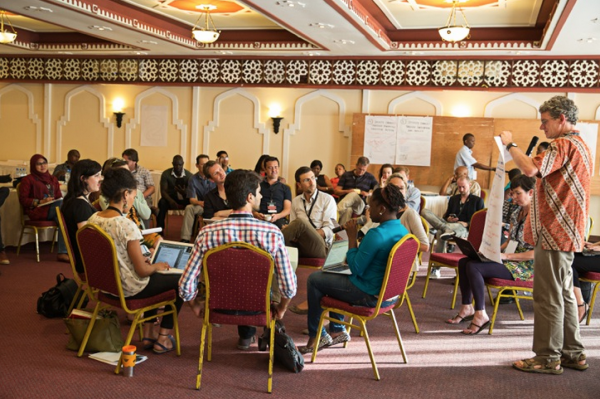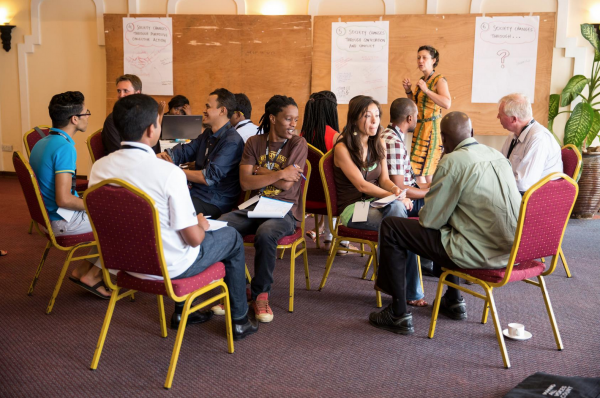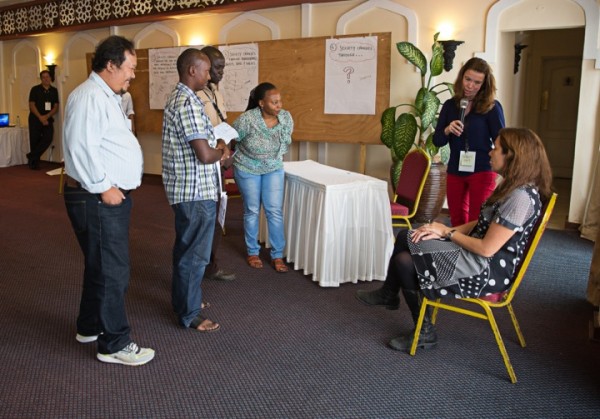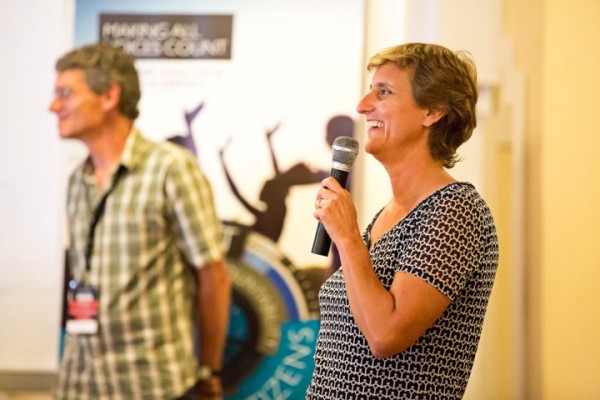A few weeks ago, I had the privilege of attending Making All Voices Count’s first Learning and Inspiration Event in Tanzania. The event brought together diverse participants (principally Making All Voices Count staff, grantees and individuals working on governance issues – I being in the latter category), with an ambitious agenda of bridging our different understandings of the challenge of Making All Voices Count and also seeking to ground our practice in the available knowledge and evidence on these issues.
Since returning, I’ve been reflecting on the event – particularly in light of Rosie McGee’s insightful summary of the key issues, questions and challenges that were raised over the course of three days. Rosie, in my view, clearly expressed the challenge inherent in Making All Voices Count’s goal of leveraging technology to drive more responsive and accountable governance:
But just at the point when this recanting over the short route began to restore the notion of accountability as politics, along came the short-code route of accountability: get your phone, text this free number, and hey presto!
Beware of the short-code route of accountability. That route leads only to decent customer service, not to accountable governance.
Bringing politics into the center of the government responsiveness equation and highlighting the tension between technology as facilitating individual ‘voice’ (i.e. feedback loops) and the possibilities of enabling more collective approaches for citizen action. What more could I add to that?
My own musings on the learning event, and the challenge of Making All Voices Count more broadly, take Rosie’s reflection as a starting point and think through some of the implications for Making All Voices Count. Fundamentally, it should seek to enable partners to realistically tackle the politics of accountability that keeps so many voices from counting. This entails capacities and tools for understanding what drives government responsiveness, and adopting strategic, collective and adaptive approaches grounded in this analysis and in ongoing learning.
Before I unpack this proposal, let me take a brief step back to say where I’m coming from. I work on impact and learning issues for the Transparency and Accountability Initiative. Among other projects, I work with TALEARN, a community of practice composed of researchers, practitioners and donors working on governance issues. TALEARN held a workshop several months ago that tackled some of the same issues and questions as in the Making All Voices Count learning event, as reflections on that meeting (including by Making All Voices Count‘s Chris Underwood) make clear. Many individuals associated with TALEARN see politics as central to citizen-state relationships (and indeed, poverty and development more generally), and thus are particularly interested in thinking and working politically in their diverse efforts to promote change.
So that brings us right into the politics of Making All Voices Count. I’m glad that Rosie highlighted the 2004 World Development Report and its framing of short and long routes to accountability. To mark the 10thanniversary of the report, the World Bank and Overseas Development Institute, held a conference highlighting the primacy of politics in service delivery for the poor. Understanding the politics of how and why governments respond to poor people is thus at the core of Making All Voices Count’s mission.
At the learning event, the facilitators from IDS took us through a systematic understanding of citizen-state relationships, which I thought usefully highlighted key elements and processes. Within this governance ecosystem of actors and processes, the ‘feedback loop’ of transmitting citizen needs/priorities to government decision makers was but one – and one in which issues of politics and power need to be better addressed.
Participants frequently discussed the political dimensions of the challenges they were addressing. Yet it seemed to me there was a general struggle to understand what was driving government responsiveness, unpacking the ‘black box’ of political will and what it really takes to change the political calculus of decision makers, especially using technology. Many projects seemed to have chosen a technological tool – often targeted at strengthening the feedback loop (or ‘short-code route’ to use Rosie’s term) – without a deep analysis of the political dynamics influencing the problem they are trying to solve. Very few seemed to adequately grapple with the ‘politics of accountability’ (why government actors will respond differently), at least in their framing of the challenge and their proposed solution. This challenge is by no means limited to Making All Voices Count grantees, but is seen across initiatives working on transparency and accountability.
My limited conversations and exposure to the grantees’ projects left me wondering whether and how they will incorporate Rosie’s advice and the ideas presented at the learning event into interventions that are already defined – often by more technical approaches.
To me, this tension suggests issues for Making All Voices Count’s overall strategy of addressing government responsiveness. In a session unpacking the factors inherent in accountability, the facilitators brought up Jonathan Fox’s framing of tactical versus strategic approaches. Tactical interventions are often short-term, linear projects based around a tool (tech-based or not) that often focuses on information provision. In contrast, strategic efforts are grounded in strengthening enabling environments for collective action, utilizing multiple and complementary approaches, and working at multiple scales (local, provincial, and national) and across the state-society divide.
At TALEARN’s recent workshop, Fox laid out a challenge to orthodox funding approaches to addressing citizen-state relationships arguing for moving beyond ‘projects’ towards more integrated approaches around collective citizen action through movements and campaigns that understand and address power and politics.
My impression, again from a limited exposure to the range of projects, is that grantees are often approaching their problems from a tactical perspective. Given that these grantees were the best of over 500 proposals from a global open call, tactical approaches may be what are out there. However, it struck me that this funding framework to date of relatively small, short-term grants might lead organisations to frame their approaches tactically as well.
So I’m left with the question of how Making All Voices Count will enable more strategic approaches in the contexts it is working in, or will it just be a collection of tactical projects? And how to best leverage technology in that equation? Technology can play an enabling roll in collective action, but this does not necessarily lead to sustainable movements. Can Making All Voices Count catalyse a shift in the Tech4Gov field from predominantly individualising technologies towards more collective, systemic approaches that understand and strengthen political voice, i.e. give voice ‘teeth’?
These challenges lead me to the issue of learning, which I think about a lot. Thinking and working politically requires numerous individual and organizational capacities, and these are much different from those of a typical project implementer, but more like those of a ‘political entrepreneur’: nuanced political analysis, savvy ‘navigational skills’ to maneuver in challenging contextual realities, and an organizational culture of critical questioning, reflection and learning. And by learning I don’t mean just acknowledging failure and ‘failing fast’; failure looks much different when you are trying to build trust, relationships and coalitions between citizens groups and government actors to enable collective action across a governance ecosystem, rather than just applying one tool after another (that’s a bit of a caricature, but you get my point). Nor does learning just mean ‘impact evaluations’, but rather monitoring and evaluation when politics matters – including rigorous evaluation as the activity progresses, not just upon completion.
By generating all these thoughts and questions in my head, the Learning and Inspiration Event was certainly a success! And indeed, while the above points are in many ways daunting challenges, I do see them as key opportunities for the programme, and was encouraged that many of these points were raised by others at the learning event – notably by Mark Robinson and Rakesh Rajani – and discussed by grantees and staff members themselves.
I was also impressed by the presentation by Director Marjan Besuijen, who laid out some of the lessons the program has learned over its first year of existence, and how Making All Voices Count will be adapting moving forward. Indeed, learning and adaptation are at the heart of thinking and working politically, so if a consortium of three very different organisations with multiple funders can do this, then surely Making All Voices Count can help its own grantees and partners move in this direction as well! I was particularly encouraged to hear that moving forward Making All Voices Count will emphasize deepening analyses of and strategic engagement in country-level accountability ecosystems, a role in brokering and convening, and strengthening local capacities and learning processes.
So overall, I think Making All Voices Count has taken on a grand challenge, one that external actors have been seeking to address for decades (with decidedly mixed results). The inclusion of tech shouldn’t mean we forget the lessons that have been learned along the way (and continue to learn), particularly around the politics of governance. If this programme can enable partner organisations to leverage technology to address government responsiveness in a politically-informed and systematic manner, this would be a significant advance for the field. I’m looking forward to learning with them as they go along!
About the author
Brendan Halloran works for Transparency and Accountability Initiative.Related content
-
PUBLICATION | November 21, 2014
Bridging and bonding: improving links between accountability actors -
PUBLICATION | July 7, 2016
Accountability ecosystems: directions of accountability and points of engagement -
PUBLICATION | December 6, 2016
Scaling accountability through vertically integrated civil society policy monitoring and…



